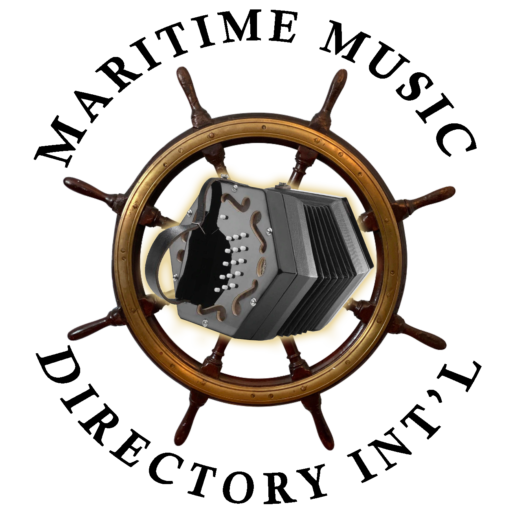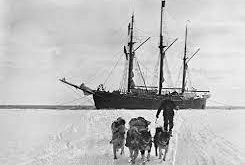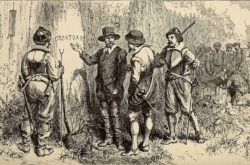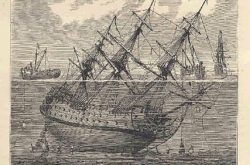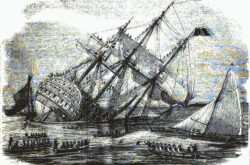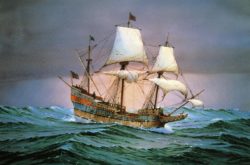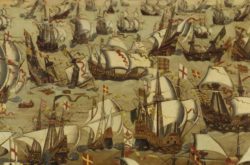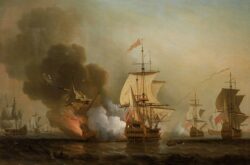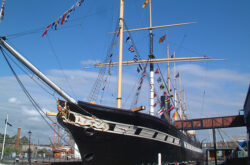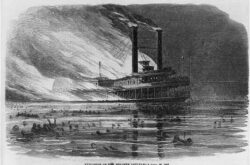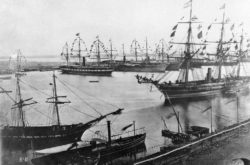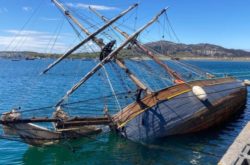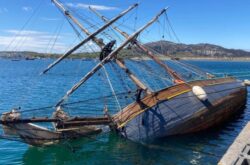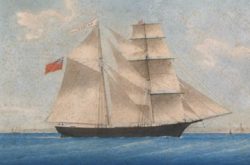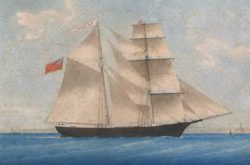Roald Amundsen becomes first explorer to reach the South Pole
On December 14, 1911, Norwegian Roald Amundsen becomes the first explorer to reach the South Pole, beating his British rival, Robert Falcon Scott.
Amundsen, born in Borge, . . .
Roanoke Colony deserted (1590)
The Roanoke Island colony, the first English settlement in the New World, was founded by English explorer Sir Walter Raleigh in August 1585. The first Roanoke colonists . . .
Royal George Sinks During Refitting (August 29, 1782)
Royal George sank on 29 August 1782 whilst anchored at Spithead off Portsmouth. The ship was intentionally rolled so maintenance could be performed on the hull, but the roll became unstable and out . . .
Royal George Sinks During Refitting 29 Aug 1782
Royal George sank on 29 August 1782 whilst anchored at Spithead off Portsmouth. The ship was intentionally rolled so maintenance could be performed on the hull, but the . . .
Schooner Lyman M. Law Sunk (2 Feb 1917)
The Austrian submarine U-35 bombs and sinks the American schooner Lyman M. Law in the Mediterranean Sea off the coast of Cagliari, Sardinia. The Lyman M. Law, captained . . .
Sir Francis Drake claims California for England
During his circumnavigation of the world, English seaman Francis Drake anchors in a harbor just north of present-day San Francisco, California, and claims the territory . . .
Sir Francis Drake Sets Sail (1577)
English seaman Francis Drake sets out from Plymouth, England, with five ships and 164 men on a mission to raid Spanish holdings on the Pacific coast of the New World and . . .
Sir Robert Dudley Dies (6 Sept 1649)
Sir Robert Dudley (7 August 1574 – 6 September 1649) was an English explorer and cartographer. In 1594, he led an expedition to the West Indies, of which he wrote an account. . . .
Spanish Armada sets sail to secure English Channel (1588)
On May 19, 1588 a massive Spanish fleet, known as the “Invincible Armada,” sets sail from Lisbon on a mission to secure control of the English Channel and transport . . .
Spanish galleon San José sinks in battle (8 June, 1708)
June 8, 1708 the count of Casa Alegre knew a squadron of English warships was lurking in the area, but he thought he could avoid it. As captain of the Spanish galleon San . . .
SS Great Britain returns to Bristol Harbour after 127 years (1970)
In 1970, after Great Britain had been abandoned for 33 years, Sir Jack Arnold Hayward, OBE (1923–2015) paid for the vessel to be raised and repaired enough to be towed . . .
St. Patrick’s Song released by Tom Lewis
Today, Sunday, March 16, 2025 veteran maritime music performer Tom Lewis released his joyful new tune on YouTube, St. Patrick’s Song. Tom writes, “Coming . . .
Steamboat Sultana Explodes (1865)
On April 27, 1865 the steamship Sultana exploded on the water. This Civil War ship explosion killed more people than the Titanic sinking.
The Sultana was only legally allowed . . .
Suez Canal Opens (17 Nov 1869)
The Suez Canal, connecting the Mediterranean and the Red seas, is inaugurated in an elaborate ceremony attended by French Empress Eugénie, wife of Napoleon III.
Read the . . .
The Gold Coast King Who Fought the Might of Europe’s Slave Traders
New research reveals links between the 18th-century Ahanta leader John Canoe and the Caribbean festival Junkanoo
Every Christmas, residents of the Bahamas head outdoors, . . .
The Great Australian “Shanty Off!”
The Great Shanty Off! Calling all Sea-Shanty groups!
We are seeking expressions of interest from shanty groups (big or small) located on the Eastern Seaboard of Australia . . .
The Mary Celeste is spotted at sea (1872)
The Mary Celeste, a ship whose crew mysteriously disappeared, is spotted at sea December 5, 1872.
The Dei Gratia, a small British brig under Captain David Morehouse, spots . . .
The Mary Celeste is spotted at sea (5 Dec 1872)
The Mary Celeste, a ship whose crew mysteriously disappeared, is spotted at sea.
The Dei Gratia, a small British brig under Captain David Morehouse, spots the Mary Celeste, . . .
